Esther considers herself “very lucky” she was diagnosed early
The Leukaemia Foundation does not endorse any form of treatment. Please obtain advice from a treating specialist.
Esther Xu flew back to China for three days in May 2016 to be the only bridesmaid at the wedding of a best friend from high school, and to see her parents.
Little did she know that three weeks later she would be diagnosed with lymphoma.
“I always laugh with my best friend and say, ‘I’m glad I knew that after your wedding, otherwise you wouldn’t have had a bridesmaid’,” explains Esther, a mechanical engineer, 40, of Melbourne.
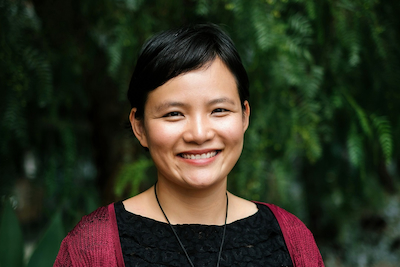
Esther, whose Chinese name is Cheng, is an only child. She migrated to Australia in 2007 when the international company she worked with in Shanghai offered her a job transfer here. Then, after spending a couple of years working in New Zealand, Esther chose to settle in Australia.
She bought a house in Melbourne in 2012 and was developing her career, “and living a very comfortable life”, so being told she had lymphoma was “quite a shock” for Esther who has no family in Australia.
Two months before her diagnosis, on May 31, Esther had some mild symptoms including stomach pain, which was attributed to her being helicobacter pylori positive, and she was treated with antibiotics.
“I didn’t think it was serious because I still am always very healthy and I was eating healthy as well,” she explained.
But she developed stomach pain again on her return flight home to Australia. When it became severe, Esther’s instinct was to go back to her GP and ask, “apart from more antibiotics, is there anything else I can do to help this issue?”.
“He suggested I go for a gastroscopy,” said Esther.
This scared her as she had been traumatised by her mother’s experience of having a gastroscopy without anesthesia in China, but Esther decided to go ahead with the procedure. Afterwards, when her gastroenterologist showed her an image of her stomach with a lot of lumps, like a volcano, he said, ‘we won’t know until we get the biopsy result’.
“I thought it may relate to having autoimmune hepatitis before,” said Esther.
“I never thought about it being cancer until two days later when I was asked to go to his clinic. That’s when I started sensing there might be something wrong, something more severe. He showed me the biopsy results and gave me this diagnosis.
“He told me it was a non-Hodgkin lymphoma, which I couldn’t get my head around because my family didn’t have a cancer history,” said Esther.
“I had heard about leukaemia, but I had no idea about lymphoma.
“I’ve got diffuse large B-cell lymphoma and because it’s gastric lymphoma my doctor told me that had a better chance to be cured,” she said.
“So I felt very lucky, until I ring my housemate and she starts crying, and then I start realising, ‘yeah, it’s cancer’. It still has a risk to die and now I’m scared, and I cry too.”
Esther was referred to a haematologist and she spent two days in hospital being screened, having her lymphoma staged, and her treatment plan explained to her.
“I was very lucky, it was stage one, it was caught early and was confined in the stomach.”
She began six months of intensive treatment – chemotherapy and radiotherapy – from July to December 2016.
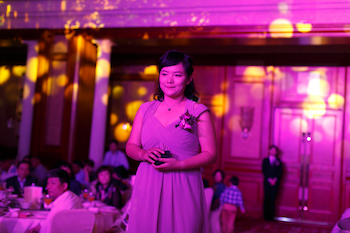
The first two cycles of chemo were challenging. On the 10th day, during the first cycle, Esther got pneumonia and ended up in hospital. Then, on the 10th day of the second cycle she got a fever again.
“I just thought, oh my god, I have to go to hospital again. I can’t do that,” said Esther.
“At the time my housemate was learning reiki [a Japanese form of energy healing]. She said, ‘Esther, give me 30 minutes. I’m doing some reiki on you. If it didn’t work, you’ll ring the ambulance and go to the hospital’.
“I said, okay, I have nothing to lose, I want to try it. After 30 minutes my fever dropped from 38 point something to 37 point something and then it was slowly dropping over the next 30 minutes,” said Esther.
She didn’t go to hospital during her second cycle, and she decided not to tell her haematologist about this fever experience, “because he’s quite a traditional western doctor”.
“Then, from the third cycle, my haematologist started giving me this shot [colony-stimulating factor] that boosts your white blood cells, so you don’t get infection.”
Esther finished her chemo protocol in mid-October, and after a four-week break, she had 20 sessions of radiation – five days a week for four weeks – and she was actively involved in the development of her own radiation plan.
Esther worked with her doctor on the details of her radiation plan
The radiation oncologist explained where the beams would go through Esther’s body, from different angles to the stomach area, and the strength of the radiation therapy.
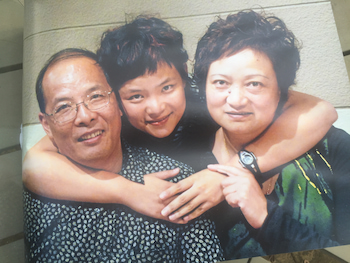
“I told him, ‘because I had autoimmune hepatitis before, my liver is a little bit more vulnerable. Also, as a young woman, I may want to carry a child, and I was worried about how much radiation might impact my breast and ovary areas,” said Esther.
She explained that if she had to compromise parts of her body, she wanted these to be healthy organs rather than already vulnerable ones, like her liver.
“He agreed, and then I also told him, which was quite hilarious, I said I was a mechanical engineer, so I did a lot of design throughout my career, so can we make another time to do the design together?
“He actually accepted my offer, so we made another appointment,” explained Esther.
“We got out pen and paper and we did the 3D modelling design together. Even a degree different angle can cause less impact on a part of the body organ. Then he was showing me on his computer how the radiation plan looked. At the end, we both agreed on the plan,” said Esther, who signed off on it with a feeling of, “I’ve done the best for myself”.
“I’m really grateful for that doctor to allow me to do that instead of feeling offended, like I challenged his status or something,” said Esther.
“I found that, as a patient, was very empowering because I feel I’m in control of my health.”
Self-advocating gave Esther power and eased her fears
Just prior to having further screening, when she was first diagnosed, Esther’s haematologist gave her a lymphoma information booklet.
“He said he’d see me again in two days, to tell me the results,” said Esther, and this marked the beginning of Esther advocating for her own health.
“Over those two days I have never read a book so diligently.”
“I used different pens, highlighting my questions in different colours. I have a lot of questions from that lymphoma book.
[Here’s a link to the Leukaemia Foundation’s disease information booklet, Non-Hodgkin Lymphoma (NHL) – a guide for people with NHL and their support people that you can read or download]
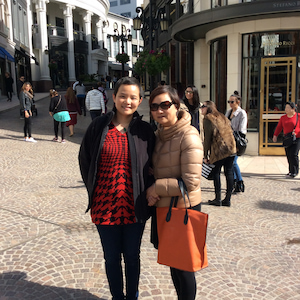
“When he came to deliver the news, ‘you’re stage one, you’re chances of survival are 80-85%, you need to do this treatment and that treatment’, I was prepared,” said Esther, who stopped him as he was leaving.
“Doctor,” she said, “I read your book and I have some questions, and would you be able to answer those questions?”
“He’s very nice, and he said, ‘yes, sure’. He sat down to go through my questions.
“I asked about future side effects, about fertility, and the ability to carry a child. He agreed to give me an extra month to do my IVF before going on chemo.
“I basically used another half an hour of his time, but I think it’s very important for me to understand all the risks or what I need to know.”
This gave Esther personal power. It made her feel important and comfortable that she was making the right choices. And she got over her fear, “knowing I can be brave enough to have a conversation with the doctor”.
“Before, I was very scared because I was just by myself. There’s no one here with me. I felt very vulnerable to face the diagnosis by myself,” she said.
“But I have to say, when the doctor told me it’s stage one, it’s a big relief for me. It makes me feel very confident and this additional conversation made me feel in control of my health.”
Esther’s plans for after she finished treatment
A couple of months before her treatment ended in December, which is when Esther was told she was in remission, she decided she’d go to Mexico.
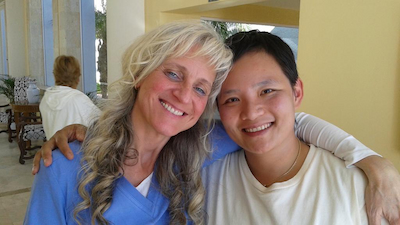
“After experiencing that reiki, I’m getting more and more intrigued by how alternative health can help during cancer, and especially supporting recovery,” she said.
“I wanted to try alternative healing because I feel chemo and radiation totally emptied my body and I want to feel like nurturing my body, to build my immune system quickly.
“I told my haematologist, and he thinks I was a little bit crazy. My parents do not agree. All my family and my doctors – they’re all against it. Only my housemate and one or two friends in my circle are supporting me.
“But I feel it’s the right thing for me to do. I went, and I’m grateful I went,” said Esther who travelled to Mexico two weeks after finishing radiotherapy.
“The first time, I went with my mum as my companion. I did a five-week alternative treatment there.”
At an integrative hospital, Esther had intravenous high-dose vitamin C and a range of other treatments in a hyperbaric chamber, along with detoxing and an organic food diet.
“They retune your body and immune system,” summed up Esther.
“It’s very expensive. I basically used all my savings. A doctor friend said, ‘the money you spent, I could buy a Mercedes Benz, but I said, ‘it’s worth spending that much money on myself’.
“I was very grateful for doing this kind of detoxing and healing. It changed my life, not only the physical healing, but also the emotional healing.
“That healing brings me to see a new perspective about how this cancer experience brought me to face myself, my past, and to really getting to know myself.
“For the first time, I realised I feel a lot of trauma from childhood.”
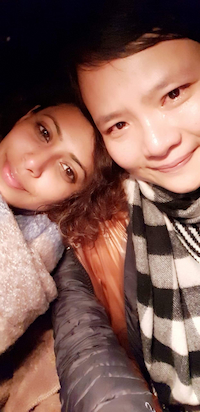
After those five weeks in Mexico, Esther said her energy level had recovered 60-70%.
“I even took my mum to travel to Los Angeles and San Francisco for a week.”
Another important thing that happened afterwards is that she began menstruating again.
“Three weeks after I was in that hospital, I got my period and that means a lot to me,” said Esther.
Back in June 2016, Esther’s haematologist had told her it was likely that the chemotherapy would cause her to go into early menopause.
“It was a really hurting feeling for me, as a young woman,” said Esther about being told of that possible long-term effect of treatment.
When she returned to Australia in 2017, she phoned her haematologist and said, “I have my period back”.
“He couldn’t believe it,” said Esther.
Getting on with life after lymphoma
Back in Australia, Esther started working again, three days a week, and a year later she returned to Mexico, in 2018, to further support the recovery of her body, and “mainly for the emotional therapy”.
She was struggling with the sales role which she had moved to prior to her diagnosis.
“I find it’s very hard physically to keep up with that workload and the pressure to achieve your results and stay on budget,” said Esther.
“Also, at this time, I started wondering what I really want in life, and I started thinking about what’s the meaning of life.
“Now I get a second chance in life. How do I want to live? What do I want to do?”
“That’s why, eventually, seven/eight months after I came back from Mexico in 2018, I quit my job; I wanted to figure out what I really want in life.”
That was three years ago and until then engineering had been Esther’s “whole identity”.
“My job to me at that time is everything. Suddenly, I let go of my engineering and I become nothing, and that’s when I went through a moment of depression, really depression, anxiety.
“I did a bit of soul searching by travelling in Australia and overseas to figure out my life.”
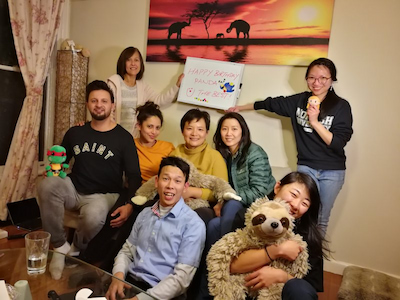
She travelled alone and the people she met, and the things Esther did, boosted her confidence again after the isolation of her cancer journey.
“I started doing a lot of mindfulness things. I started helping people in the community rather than working in the corporate world.
“One day, I got a chance in a yoga festival to share my story. Then, from that moment, I know that’s it… I want to share my story.
“That’s where I find my meaning, sharing my journey to the world, to the people going through a similar experience, and helping them.”
Esther started public speaking as a motivational speaker.
“Building connection with people is definitely more fun and more meaningful than getting a $10,000 purchase order,” said Esther, who doesn’t miss her engineering sales work.
“Sometimes I’m using cancer as a story, but I also share how I got through – especially emotional struggles during those challenging times – and sharing the tools I’ve learned from people.
“The other thing is sharing my journey with medical students and doctors about personal care in cancer treatment. Also, the complementary medicine experience I had,” said Esther, and recently she began a new part-time job, as a health educator for women’s health.
How Esther feels about her future
“With this pandemic, sometimes this uncertain world strikes me, but I’m actually very excited about my future. Hopefully I can live a more meaningful life,” said Esther.
“I feel finally I can reclaim my dream to live life with a purpose, by inspiring many people.
“I’m on the right path. I’m feeling hopeful.
“I don’t want to waste this cancer opportunity. I want to turn that into good, not just for myself but for others. I want to show people the whole journey – before cancer, during cancer, and after cancer – so people can see the big picture of how this cancer episode can bring some impacts to your life overall,” she said.
It’s more than five years since Esther’s diagnosis. She has six monthly check-ups with her haematologist and she’s “100% confident” she’s beaten lymphoma.
“If I tune into my heart, I truly think so, but to be honest, at the back of my mind sometimes I still have a little fear and some worry thoughts bothering me,” she said.
“I try not think about the word ‘cure’. I want to focus on everyday life, always trusting in my journey.”
“I think cancer is the last alarm. It’s the body saying to us, ‘hey, I need your help. Please, please help’,” she explained.
“I’m trying to be more gentle with myself. Nowadays, I no longer really push myself. If I’m tired, I will rest.
“I used to be very strict with deadlines and I worked at certain levels. Now I’m thinking it’s okay not to do it perfect. It’s okay if you haven’t finished.
“Every morning when I wake up, I sit quietly and I put my hand on my heart and ask myself a question, ‘body, what do you want to tell me today?’.
“If my body says, ‘I’m tired’, I say, ‘okay body, I’m going to take it easy today. When my body says, ‘oh, I want to be joyful’, I say, okay body, maybe we’ll go for a walk.
“I always do that. It’s my housemate who shared this with me – everyday to ask yourself a question.
“I just want to love my body a bit more because that’s all we have as a temple to carry on for our journey, so we need that.”
Esther really misses her parents and hopes to go back to China to visit them this year “if the border opens”.
“I haven’t seen my mum for three years, and the last time I saw my dad was five and a half years ago when I went to my friend’s wedding.”
Find out more about Esther’s story by listening to the Talking Blood Cancer podcast: How blood cancer helped Esther find her authentic self
Last updated on February 9th, 2022
Developed by the Leukaemia Foundation in consultation with people living with a blood cancer, Leukaemia Foundation support staff, haematology nursing staff and/or Australian clinical haematologists. This content is provided for information purposes only and we urge you to always seek advice from a registered health care professional for diagnosis, treatment and answers to your medical questions, including the suitability of a particular therapy, service, product or treatment in your circumstances. The Leukaemia Foundation shall not bear any liability for any person relying on the materials contained on this website.